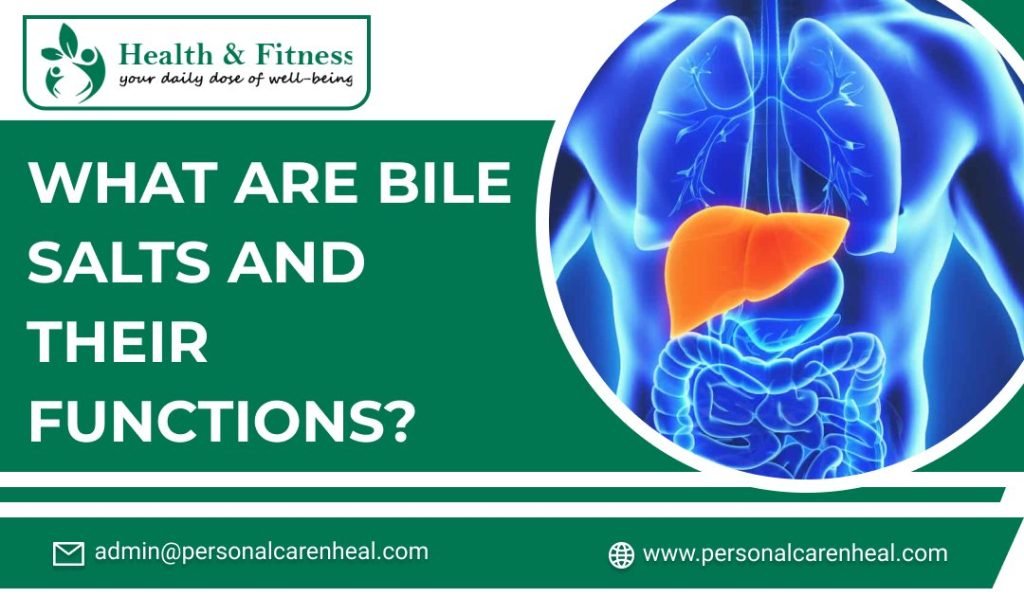The digestive fluid known as bile, which is made by the liver, contains bile salts and other ingredients that aid in the breakdown of dietary lipids. The liver produces 500-600 milliliters of bile every day, mostly made up of water and electrolytes but also including bile salts, phospholipids, cholesterol, bilirubin, and ingested substances including proteins.
What are Bile Salts?
In the first section of the small intestine, in the duodenum, bile a greenish-yellow secretion, is in charge of helping in fat digestion. When wastes are produced into bile, the body also gets rid of them that way.
The gallbladder, which is connected to the liver and sits on top of the small intestine, receives bile that is continuously secreted from the liver’s cells.
Bile is stored and concentrated in the gallbladder by the absorption of water and minute electrolytes.
Bile and other secretions are held in the body until they are required for digestion.
Our bile duct opens after we eat, allowing bile, secretions, and enzymes to perform their functions.
The primary organic substance in the bile is bile salts. They enable the body to eliminate bilirubin, medication metabolites, and potentially harmful substances like cholesterol.
Hepatocytes, the type of liver cells that produce bile salts, store them in the gallbladder and secrete them into the first segment of the small intestine.
The body then recycles and uses them once more when they are reabsorbed and brought back to the liver.
What are the Benefits of Bile Salts?
- Eliminate Toxic Compounds and Cholesterol
- Fight against Infectious agents
- Promote Liver and Gallbladder Function
- Dissolve Gallstones
- Allow for the Absorption and Digestion of Nutrients and Fats
- Affect Bacteria in the Gut
- Control Blood Sugar Levels
- Trigger the Release of Glutathione
- Abolish Bilirubin
Bile Salts Function
Bile salt function is not only limited to lipid emulsifiers but also controls the osmotic flow of bile from the liver into the bile capillaries (bile canaliculi). The bile salt-dependent flow, or BDSF, is the name given to this particular flow. These mechanisms allow the flow of bile formed by hepatocytes into the gall bladder, in combination with the Bile Salt-Independent Flow (BSIF).
- Bile salts also play the role of signaling molecules that help in controlling both fat and glucose metabolism. This is accomplished by turning on specific cell receptors involved in the metabolism of fat and glucose.
- Additionally, lipid levels and inflammatory responses are reduced by receptor interaction.
- High amounts of fatty acids in the blood, increased insulin resistance, poor glucose tolerance, and liver damage was observed in studied on mice in which these receptors were inhibited.
- Additionally, the same receptors can be used to control bile acid levels by inhibiting or stimulating bile acid synthesis and excretion. Some people take these salts in the form of purified bile salts.
Bile Salts Side Effects
If the fat-soluble vitamins and fatty acids you consume cannot be absorbed they move into the colon and can create problems.
People with insufficient bile salt production and storage, possibly as a result of gallbladder removal, may experience the following bile salts side effects:
- Trapped Gas
- Stomach Cramps
- Jaundice
- Diarrhea
- Nausea
- Erratic Bowel Movements
- Bad-Smelling Gas
- Weight Loss
- Nervous System Disorder
- Pale-Colored Stools
- Neuropathy Peripheral
Bile Salt Supplements
Bile salt supplements may be used by those people who lack bile salt to treat these symptoms. Additionally, since bile contains around 85% water, it is crucial to maintain hydration.
Eating a lot of beets and beet greens can also be beneficial for persons who do not create enough bile salts. This is due to the fact that they are rich in betaine, one of the most potent nutrients for liver detoxification.
What Do Bile Salts Do?
Mostly people have question that what do bile salts do exactly. In this process, larger dietary fat glucose is broken down into smaller fat droplets by bile salts. The digestive enzymes of the pancreas break down minor fat droplets effortlessly.
The digestive enzymes of pancreas can process and more easily split down smaller fat droplets. The gut cells are helpful in absorbing fat droplets with the help of the bile salts.
Final Say
Purified bile salts supplements, which are sold in vitamin shops and online for those who have a deficit, may be helpful. By emulsifying lipids, bile salts supplements try to restore the cholesterol-lowering benefits. Personal Care N Heal also delivers information regarding health-related topics.



